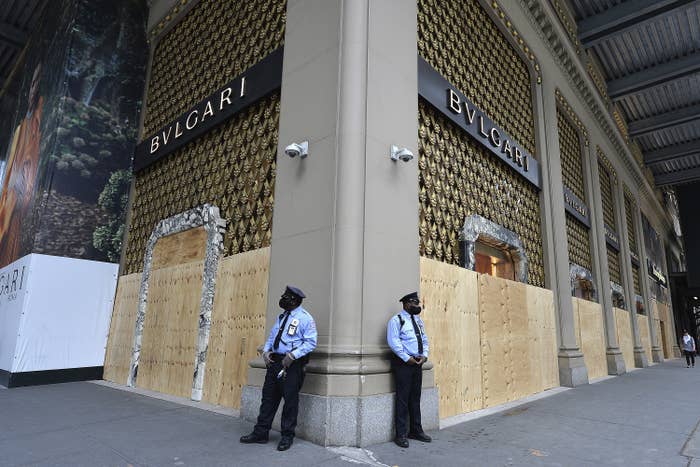
With the election looming — and with it the possibility of more civil unrest — Phil Tobin, the owner of H&B Jewelry and Loan in downtown Portland, Oregon, decided he needed to invest in a new business expense: a pair of armed guards to protect his store for several days in early November.
Tobin, whose business has long been an institution in downtown Portland because it provides small but vital loans for many customers, said his store was battered by vandalism this summer. It was also broken into three times, which cost him thousands in losses.
“The police are telling everyone they have a plan,” Tobin said, but he doesn’t trust it, especially after the violence that exploded during protests this summer. “I’m disgusted with the city government. They’ve done absolutely nothing.”
Tobin is one of an increasing number of business owners across the country who have decided this year that they need to supplement the protection local police typically provide by paying for private security. As the United States hurtles toward a sharply contested general election, following months of unprecedented protests and conflict, this is one industry in a battered economy that is booming.
Some worry that dispatching tens of thousands of armed private security forces onto the streets in a time of tension and chaos could further destabilize the situation. Earlier this month, a private security guard hired by a Denver-based news crew for protection while covering a protest shot and killed a protester. And the Washington Post reported that in Minnesota a security firm was hiring former special operations personnel from the US military to guard polling places — a move that the state attorney general said would amount to voter intimidation.
“I am concerned,” said Deborah Avant, a professor at the University of Denver who runs the school’s Center for International Security, “given both the unevenness of regulation around the country and reports of links between police forces and right-leaning extremist groups, which may lead private security to be a mechanism for pursuing extreme ‘law and order’ actions.”
But many businesses just want to make sure they’re protected, said Robert Dodge, an executive vice president of corporate risk at G4S, a multinational private security firm.
“Our phones are ringing quite frequently,” he said, adding that the requests for services like consulting and additional security have already added up to “millions of dollars” in new business.
Most of the calls have come from companies in large cities that have seen a lot of protests this year, several security executives said.
“Regardless of who wins, they’re concerned about rioting, attacks on their CEOs or their facilities,” explained Michael Niner, who owns Blue Raven, a small private security firm based in Virginia that has been flooded with requests from businesses in recent weeks. “Think Portland but all over.”
Last week, Niner’s company ran an advertisement on a job site to hire personnel for “an election-related security operation.” Niner declined to name the company.
Allied Universal, one of the largest private security companies in North America, said demand for private security has been up since the pandemic was declared in March. The company has hired 75,000 new employees since then, according to figures provided to BuzzFeed News. More recently it too has run ads to hire ”flexible personnel for election season.”
Josh Skule, a former FBI agent who is Allied Universal’s senior vice president of risk advisory and consulting, explained that the ads were driven by the need to have an agile workforce that can quickly respond to any client’s needs.
“Folks in the security apparatus are very concerned about whether or not any portion of the election is going to result in additional unrest in society,” said Skule. “Our clients are trying to anticipate how and what that will look like.”
There are risks for security guards too. Last week, a security guard monitoring a ballot box in Baltimore was shot and injured, according to the Baltimore Sun. He worked for a private security firm that the city’s board of elections had contracted for the election.
Police do not believe the shooting was related to the election.
The uptick in business for the private security industry doesn’t always mean hiring armed security guards, Dodge, the G4S executive, stressed. Businesses are also requesting consulting services to evaluate any current vulnerabilities, or more hands-off services like monitoring their facilities through remote cameras, he said. In some cases, the company might advise the company to simply close for a few days around the election and then reevaluate the situation.
Overall, the move to hire private security has largely been weighted toward private entities rather than public polling places or ballot boxes. Election officials in several counties across the country that have seen widespread protests in recent months told BuzzFeed News they would not hire any additional security this year.
Still, at least one government has embraced the trend. In Portland, Multnomah County officials hired Northwest Enforcement, a local security contractor, to help protect its ballot boxes. The county has previously used contractors to monitor parking, but this is the first time it’s hired security to monitor election facilities, officials said.
Tim Scott, the director of elections for Multnomah County, said the decision to hire the contractor was in part related to COVID-19 and the increased number of ballot drop-off sites the county installed.
“They help monitor the ballot drop boxes and do patrols,” Scott told BuzzFeed News. The guards will be a mix of both armed and unarmed agents.
“We want to make sure we have operational awareness of those facilities so that we know if there's anything happening,” he said.
